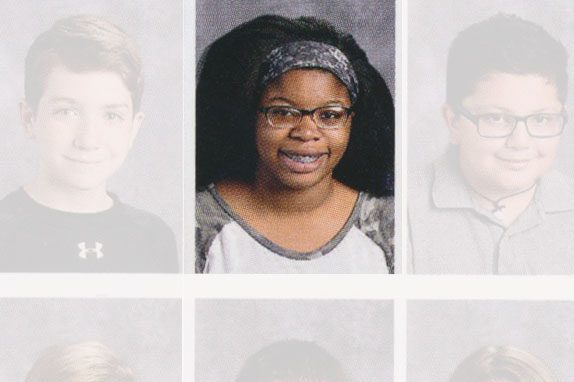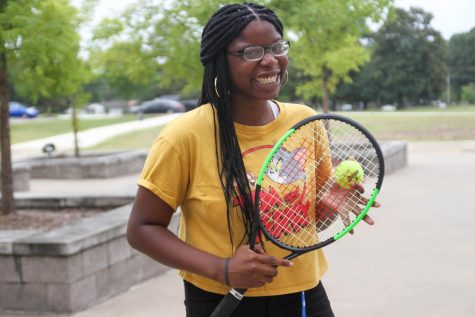Hair’s Where It All Started

Author Chelsea Nwankwo in the yearbook portrait from her 7th grade year.
December 16, 2020
It was picture day at school during my 7th grade year. That morning, the first thing I did was take myself to my bathroom mirror. My outfit was the last thing I was thinking about, because the highlight of my look that day would be my hair.
For previous picture days, I had no freedom with my hair, but for this one, I was left to my own devices. So, I styled the look I loved the most. I grabbed the blow dryer and the comb attachment for it and ran it through sections of my hair. As I did this, my hair began growing larger in volume, shaping itself around my face and draping off my shoulders. The back of my neck disappeared, and there was no evidence of my scalp besides a left part that I made.
I took my hands and smoothed down the sides to minimize the frizziness. I was content with this look and excited that it would be captured in a photo and seen by others. However, that feeling did not last past morning.
It was one of my first classes of the day, and my teacher was talking with the entire class about pictures. My teacher turned to me and said, “You forgot to do your hair this morning, didn’t you?”
I paused and then let out a chuckle, not because I found it funny, but because I was embarrassed and uncomfortable. My friends could see my discomfort, and the teacher tried to cover it up by saying it was just a joke, but the damage had already been done. Looking back, I am not embarrassed, nor upset, but I catch myself thinking: The Audacity.
Hair within the Black community is a vast and complicated topic. From natural hairstyles to chemical treatments to hairstyles with extensions, I can’t even say as a Black woman I understand its full range. However, one thing I undoubtedly understand is its significance.
Hair has been important for Black people since the beginning of time. In past decades, like the 1960s, Black hair was used as a symbol for the civil rights movement through afros. In more recent years, the Natural Hair Movement, which began in the 1960s and highlighted natural afro hair textures specifically in the Black community, was revitalized within the media in the 2000s. This movement was part of what made me realize the importance of my own afro hair in relation to self-expression.
As I’ve grown, my hair has become a source of confidence for me. I’ve gone through many tribulations, but through those, I only became prouder as a Black woman with afro hair. Though, this pride I achieved did not come without struggle. Figuring out how to maintain my hair became its own issue, but I also met an issue that I cannot physically change: the ignorance of white people interacting with Black hair.
At first, I was amused by white people’s fascination with my hair. I received comments like, “Your hair looks so soft and fluffy!” and “Your hair is huge!” I never had an issue with simple compliments, but those turned into uncomfortable suggestions–from “You have SO much hair!” to “You should straighten it.” “Your hair looks so soft!” to “I could play with it all day.” When I found myself in environments with more white people, my scalp became home to many Caucasian hands without my consent.
These experiences happened more often as I became older. The locations became stranger, the age range of people grew. One time, I went to a Wednesday night service at church, and as I was leaving, the youth leader, a white man, asked to touch my hair. Before I could manage an answer, his hands were buried in my afro. Again: The Audacity.
I don’t enjoy blaming issues on race, but in a race-fueled society, I can’t help but notice this pattern. I have encountered many people of different racial backgrounds, but this obsession with Black hair is nearly exclusive to white people–the unwarranted comments I receive, the absence of respect that I am given. I can’t help but recognize the ignorance.
I also notice that natural Black hair has little representation within the media. I can’t recall many depictions of characters who had hair similar to mine in any form of mainstream media growing up. If I did not have women and men around me with textures similar to mine, I too would be ignorant of the normality of afro hair. White people within the communities I occupy aren’t typically from areas that are filled with Black women and men flaunting their natural textures. They lack proximity to the culture, and therefore have no awareness of the negative effects of their words and actions.
It is only natural to be curious about something unfamiliar; however, who am I to excuse ignorance when society’s cultural intelligence is reaching new highs? There is an entire internet to help educate anyone willing to be educated, so why would I excuse people who are reluctant to take advantage of that resource?
Even if research isn’t the first response when faced with a differing culture, there are alternatives, like asking someone from that culture directly. I have never been asked if I am all right with people touching my hair by anyone other than other Black women. Why is it that the first response is to disrespect my boundaries? Telling me my hair would be cute straight isn’t a compliment. Touching my hair is not an acceptable form of admiration. These are things that should be simple etiquette when interacting with Black hair.
I mind my business. I go about my day and life without bothering others, so it baffles me when I can’t be granted the same courtesy because someone wants to satisfy their own curiosity. Most people have something that they treasure. Treasures are treated with the utmost respect, and that respect is expected from others. So why is it different when my treasure just happens to be my hair?
I refuse for my treasure to be diminished or sacrificed for ignorance. No matter how intriguing my hair may seem, it is a part of me and my experience as a human, and when my hair is disrespected, I am disrespected.
I can’t choose my hair, but white people can choose their actions. Choose wisely.





Adrienne Shelton | Jan 5, 2021 at 4:19 pm
As a black girl, I’ve had many of the same experiences and I am so glad that it’s being recognized!